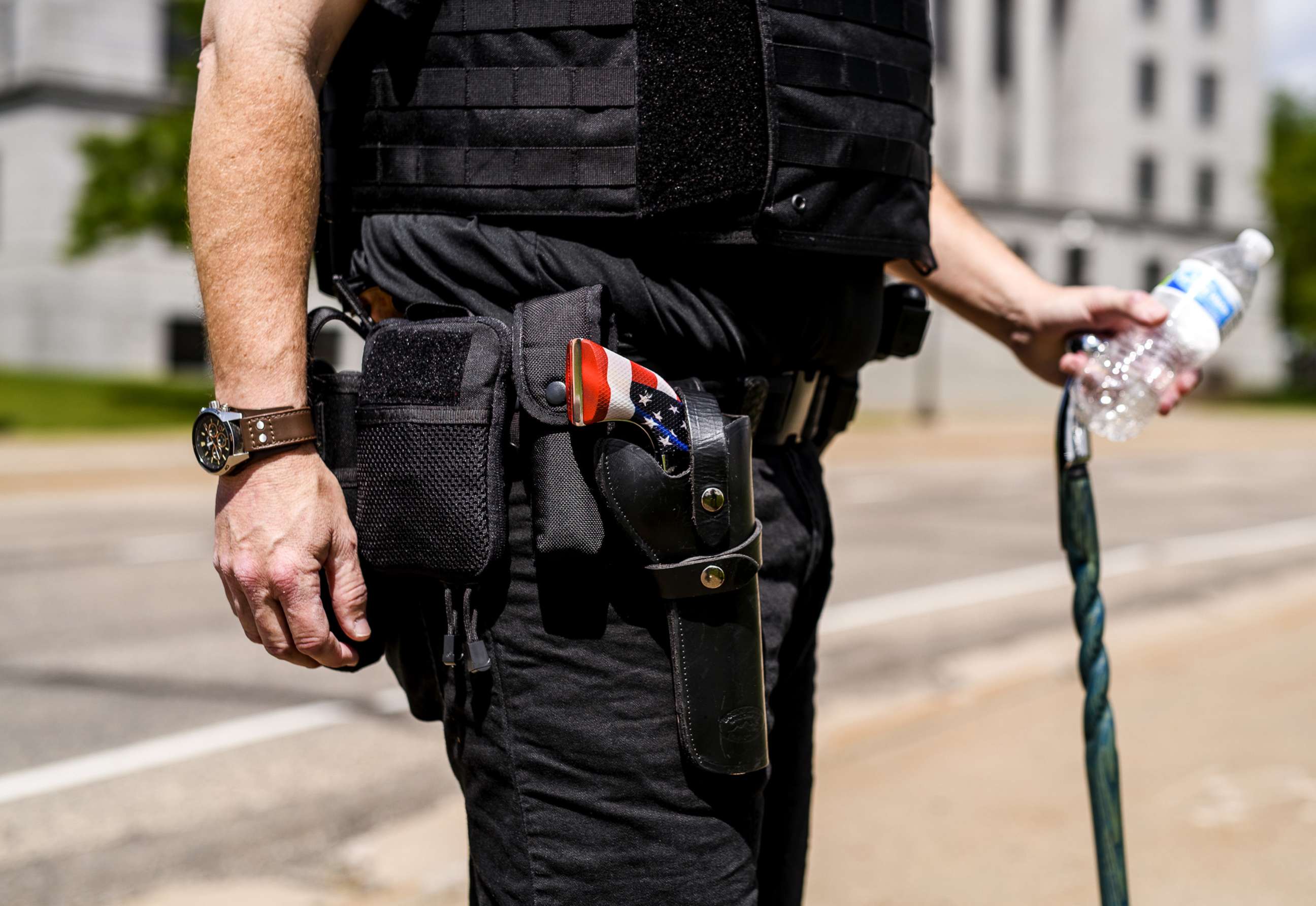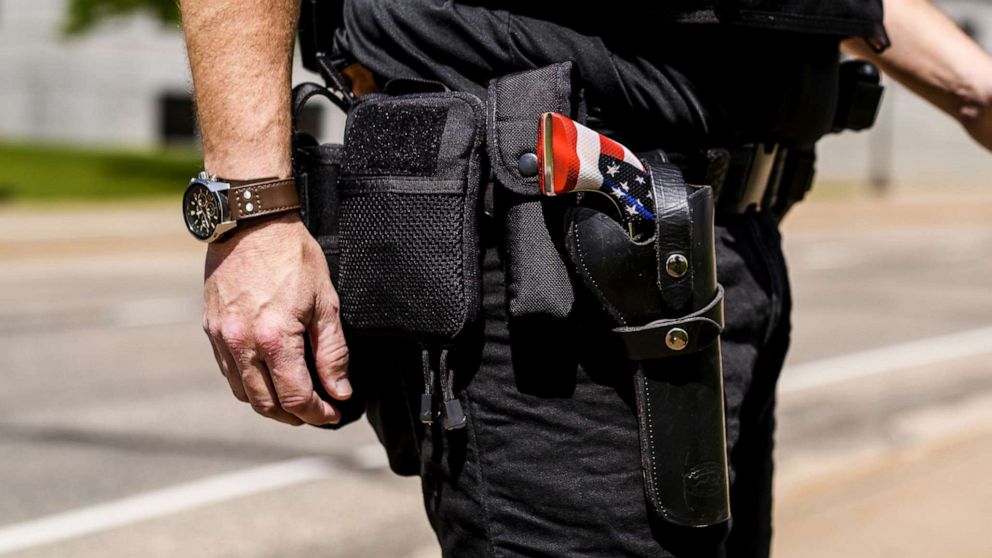Permitless gun carry laws draw opposition from law enforcement
Alabama became the latest state to remove permit requirements to carry a concealed gun in public, as multiple states debate similar measures this session.
Known as "permitless carry" or "constitutional carry" legislation, the bills have been roundly criticized by police and gun control advocates, who argue that removing permits poses a safety risk to citizens and officers. Proponents, meanwhile, claim that the permitting process is too onerous and that the laws ensure Second Amendment rights.
At hearings across the country in recent weeks, law enforcement officials have testified against these bills, which have proliferated in Republican states during the primary season.
"Police weighing in against permitless carry matters," Shannon Watts, founder of Everytown subsidiary Moms Demand Action for Gun Sense, told ABC News. "But I guess the question is at end of the day, those Republicans who are worried about being primaried, are they going to put public safety over their hopes for the primary election?"
Last year, six states -- Arkansas, Iowa, Montana, Tennessee, Texas and Utah -- enacted permitless carry measures, according to the Pew Research Center.
When Alabama's law goes into effect next year, it will be one of 22 states where it is legal to carry a concealed gun without a permit, based on data compiled by Everytown for Gun Safety, a gun violence prevention organization.

Two other states -- Indiana and Ohio -- have recently passed similar bills, which await their respective governor's signature or veto, while at least four others -- Georgia, Nebraska, South Carolina and Wisconsin -- are considering it.
In Ohio, Hamilton County Sheriff Charmaine McGuffey was one of more than 80 opponents to testify in December before a state Senate public safety committee against SB 215, which allows people 21 and older who are legally allowed to own a gun to conceal it without a permit. It also removes a requirement to tell officers about the firearm unless they ask.
"To allow people to carry concealed with no background check, no documentation of who they are and no training is dangerous," McGuffey told ABC News. "I am not against the Second Amendment -- the right to bear arms. What I'm asking people to do is consider that there must be some failsafe placed into the system."
To get a concealed carry permit in Ohio requires a fee of at least $67, a background check and eight hours of training that covers safety features and public safety. The training is especially key, McGuffey said.
"I have 900 officers," she said. "Our deputies are well-vetted for their backgrounds, their personalities, their integrity, their ability to follow rules and follow the law, and I would not hand one of them a gun with no training."
Background checks are another important piece, McGuffey said. In 2021, Ohio issued 202,920 new or renewal concealed carry permits, denied 2,668 applicants who failed to meet state requirements and revoked another 420 licenses "for causes including felony convictions and mental incompetence," according to a state attorney general's report. McGuffey said she signed 93 revocations last year for people who were convicted of menacing, domestic violence, assault and other violent actions.
Despite widespread opposition from law enforcement and citizens, the bill passed the state legislature last week.
"Responsible gun owners should not be punished for lawfully practicing their constitutional rights," state Sen. Terry Johnson, the bill's sponsor, said in a statement.

Republican Ohio Gov. Mike DeWine has until March 15 to sign or veto SB 215 before it becomes law. He has not publicly indicated what he plans to do, though in a statement to Columbus, Ohio, ABC affiliate WSYX, his spokesperson said the governor "has long supported the Second Amendment rights of law abiding citizens to keep and bear arms."
In Indiana, a constitutional carry bill is before Republican Gov. Eric Holcomb's desk, after passing the state legislature Tuesday. Under HB 1296, anyone at least 18 years old who can legally carry a handgun would no longer need a permit to do so in the state.
Among those speaking out against the bill included the head of the Indiana State Police, local sheriffs and county prosecutors.
"What we have done now is we've taken away the one tool that police officers had out on the street to be able to act quickly and efficiently for not only their personal safety but for the safety of our communities," Patrick Flannelly, vice president of the Indiana Association of Chiefs of Police, told Indianapolis ABC affiliate WRTV.
The opposition from state police and prosecutor associations swayed Republican state Sen. Kyle Walker, a lifetime National Rifle Association member who has a concealed carry permit, to vote no to the bill, he said.
The governor must sign or veto the bill within seven days, otherwise it becomes law. He has not publicly indicated what he plans to do.
"The governor will review every piece of legislation that comes across his desk and make the best determination for all Hoosiers," Holcomb's press secretary, Erin Murphy, told ABC News in a statement.
Alabama became the first state to sign a permitless carry bill into law this year on Thursday. HB 272 removes the requirement to obtain a permit to carry a concealed pistol.
"Unlike states who are doing everything in their power to make it harder for law abiding citizens, Alabama is reaffirming our commitment to defending our Second Amendment rights," Republican Gov. Kay Ivey said in a statement. "I have always stood up for the rights of law abiding gunowners, and I am proud to do that again today."
Among those who had spoken out against the bill were the Alabama Sheriffs Association, the Alabama Association of School Resource Officers and multiple local law enforcement agencies.
The Giffords Law Center to Prevent Gun Violence has also found that states with stronger gun laws have lower gun-death rates.
As Ohio's bill sits on the governor's desk, McGuffey continues to push for its veto.
"My sense is the citizens of Hamilton County are depending on our elected officials to use common sense when they are legislating bills that can potentially create violence, that can potentially put a gun in the hands of someone who absolutely should never have a weapon," she said.
Editor’s note: A previous version of this story incorrectly referred to research regarding permitless carry laws and gun violence. It has been corrected.




